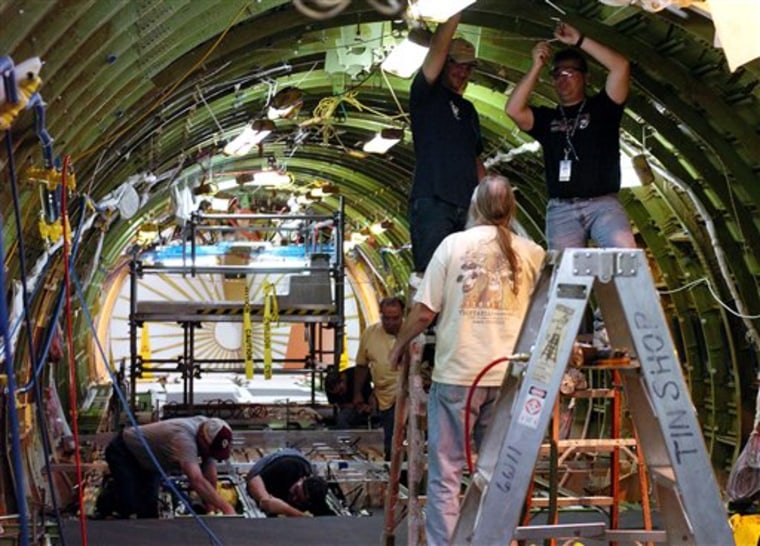The Boeing Co., for decades the brand that helped support Wichita's claim as the aviation capital of the world, announced Wednesday it will shut down facilities in the city by the end of 2013 and send work to plants in three other states as it deals with defense spending cutbacks.
The closure will cost more than 2,160 workers their jobs and end the firm's presence in an area where it has been a major employer for generations.
The decision was not a surprise because Boeing said in November it was looking at closing the Wichita plant. But it still drew an angry response from Kansas lawmakers who helped Boeing land a lucrative Air Force refueling tanker project in February and had expected thousands of jobs to come to Wichita with it. Instead, the work will go to Boeing's facilities near Seattle and Oklahoma City.
"Boeing's announcement is that things have changed," U.S. Sen. Jerry Moran said. "Well, the only thing that really has changed in my mind in the last year is Boeing now has the contract. When they made the commitments, they didn't."
The company, a major defense contractor, began looking at closing the plant at the same time the Pentagon was trying to prevent $500 billion in automatic, across-the-board defense budget cuts over 10 years in the wake of the failure by a bipartisan congressional supercommittee to agree on $1.2 trillion or more in deficit reductions.
Wichita officials had hoped the number of jobs at the facility would grow after Boeing won the contract worth at least $35 billion to build 179 Air Force refueling tankers. Modification work on the planes was expected to generate 7,500 direct and indirect jobs with an overall economic impact of nearly $390 million.
Boeing said 24 Kansas-based suppliers for the refueling tanker project will still provide parts as planned.
"In this time of defense budget reductions, as well as shifting customer priorities, Boeing has decided to close its operations in Wichita to reduce costs, increase efficiencies and drive competitiveness," Mark Bass, vice president and general manager for the Boeing Defense, Space & Security facility in Wichita, said in a statement.
The first layoffs in Wichita are expected in the third quarter of 2012. While the Seattle area will build the tanker, engineering and modification work on it will move to Oklahoma City and future aircraft maintenance, modification and support will go to San Antonio, Texas.
Oklahoma will get about 800 jobs and San Antonio will gain 300 to 400 jobs, Bass said. The company will move 200 tanker jobs to its plant in Washington, while moving 100 support jobs, primarily engineering, now in Washington to Oklahoma City in the shuffle.
Boeing said it will continue to have a significant impact on the Kansas economy and its aerospace industry. The Chicago-based company spent more than $3.2 billion with 475 Kansas suppliers last year. Kansas is the fourth largest state in its supplier network, it said.
But that wasn't enough for lawmakers like U.S. Sen. Pat Roberts, who said Boeing had promised as recently as February to remain in Wichita if it landed the tanker contract. Roberts and others urged the company to reconsider.
"Today's announcement by Boeing's leadership is hugely disappointing to me, but more importantly to the thousands of workers whose livelihoods are affected by this decision," Roberts said.
Moran called Boeing's move "a blow to our mental health as well as our pocketbooks." Kansas officials are still willing to do what it takes to keep the Boeing plant open, but "it's difficult to negotiate with someone who hasn't kept their word," he said.
Gov. Sam Brownback promised Kansas will pursue opportunities in commercial aircraft manufacturing. Aircraft makers like Cessna Aircraft Co., Hawker Beechcraft and Bombardier LearJet still have plants in Wichita, which Brownback said remains "the best place in the world to build airplanes."
Boeing has had a facility in Wichita since it bought the Stearman Aircraft Co. in 1929.
Employment at the plant peaked during World War II as the company churned out four bombers a day. Its 40,000 workers included President Barack Obama's beloved grandmother Madelyn Dunham, known as "Toot," who did her part for the war effort by working the night shift as a supervisor on the B-29 bomber assembly line.
The company remained Wichita's largest employer for decades after the war.
It still had about 15,000 workers in the city in 2005, when it spun off its commercial aircraft operations in Kansas and Oklahoma. After the divestiture, Boeing kept 4,500 workers for its defense work in Wichita but layoffs have since slashed that number.
Even with the defense plant's closure, Boeing will have an economic impact in Wichita. Spirit AeroSystems, which took over Boeing's commercial aircraft operations, builds parts for the company.
"But it would be different to a certain extent because of the fact that, you know, it is kind of like family that you actually have and a member of the family is moving away," said Mayor Carl Brewer, who once worked for Boeing himself. "So there is a lot of emotional and economic attachment tied to this."
